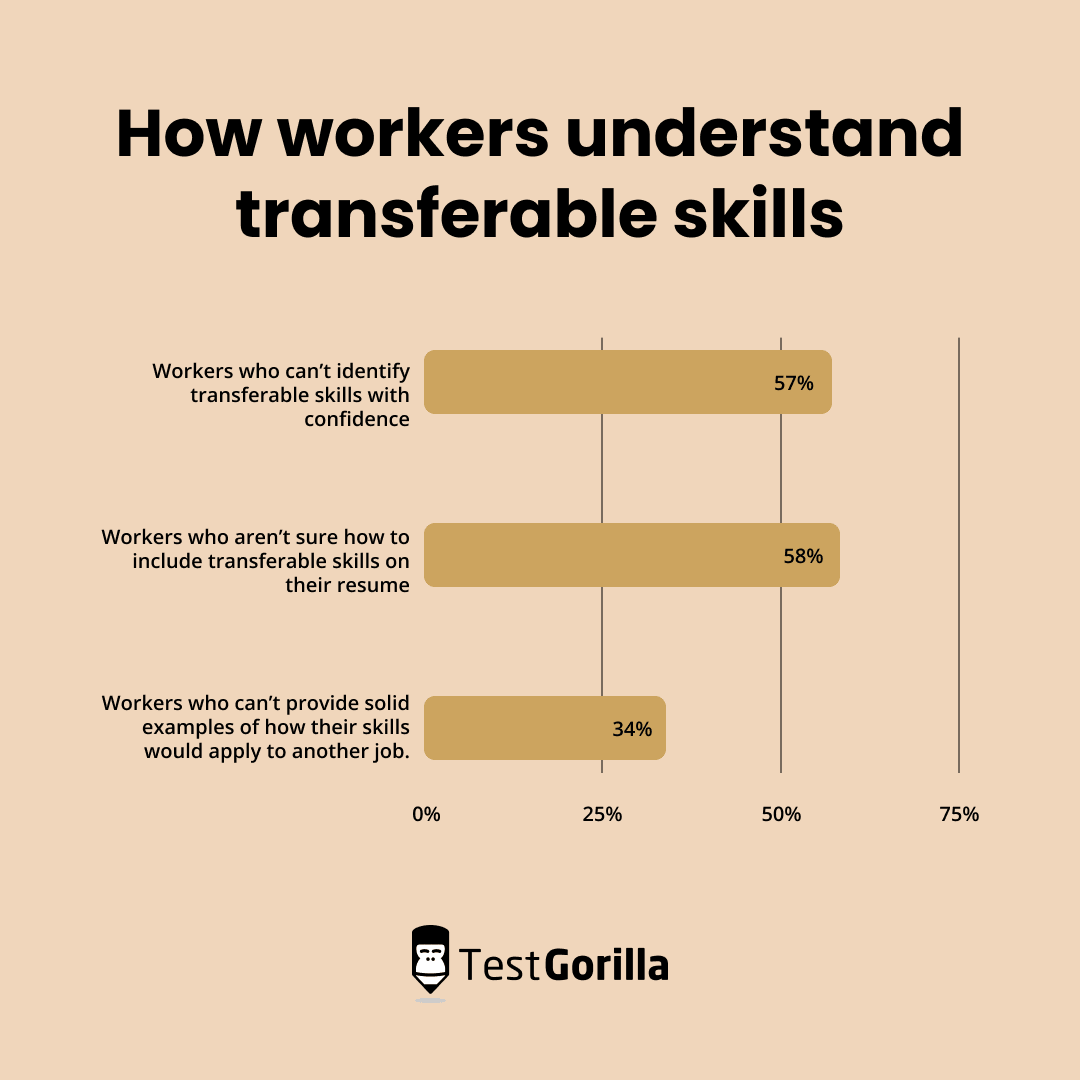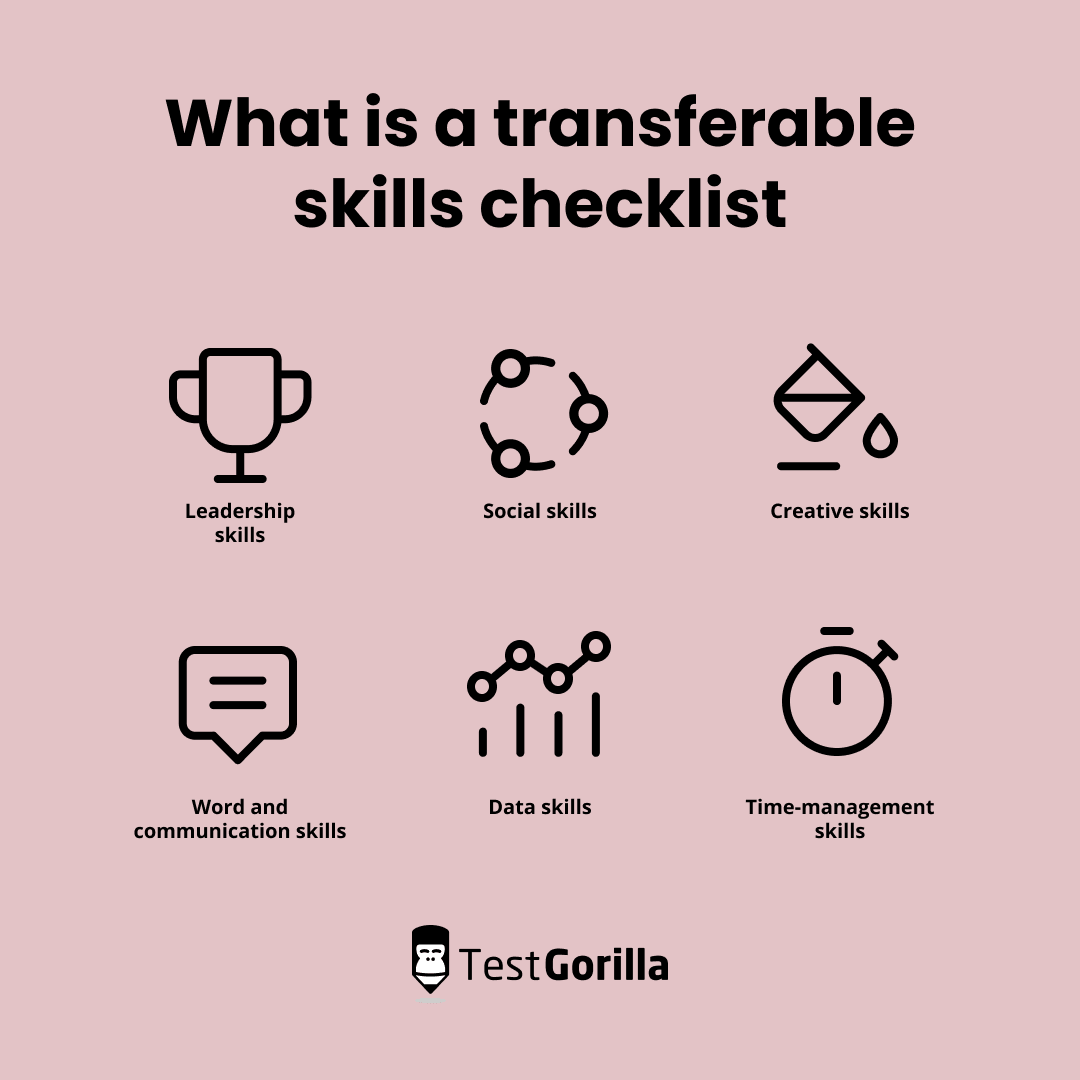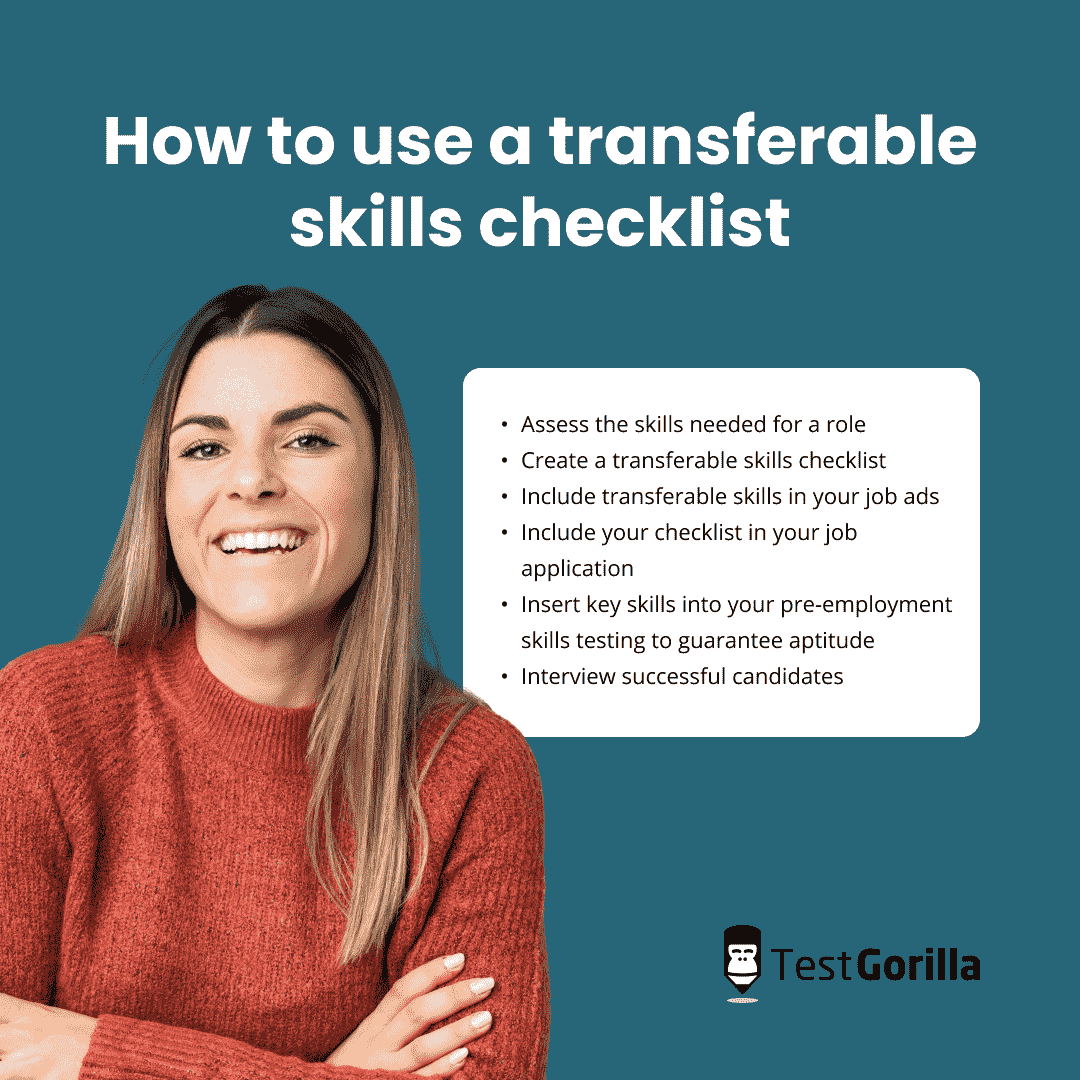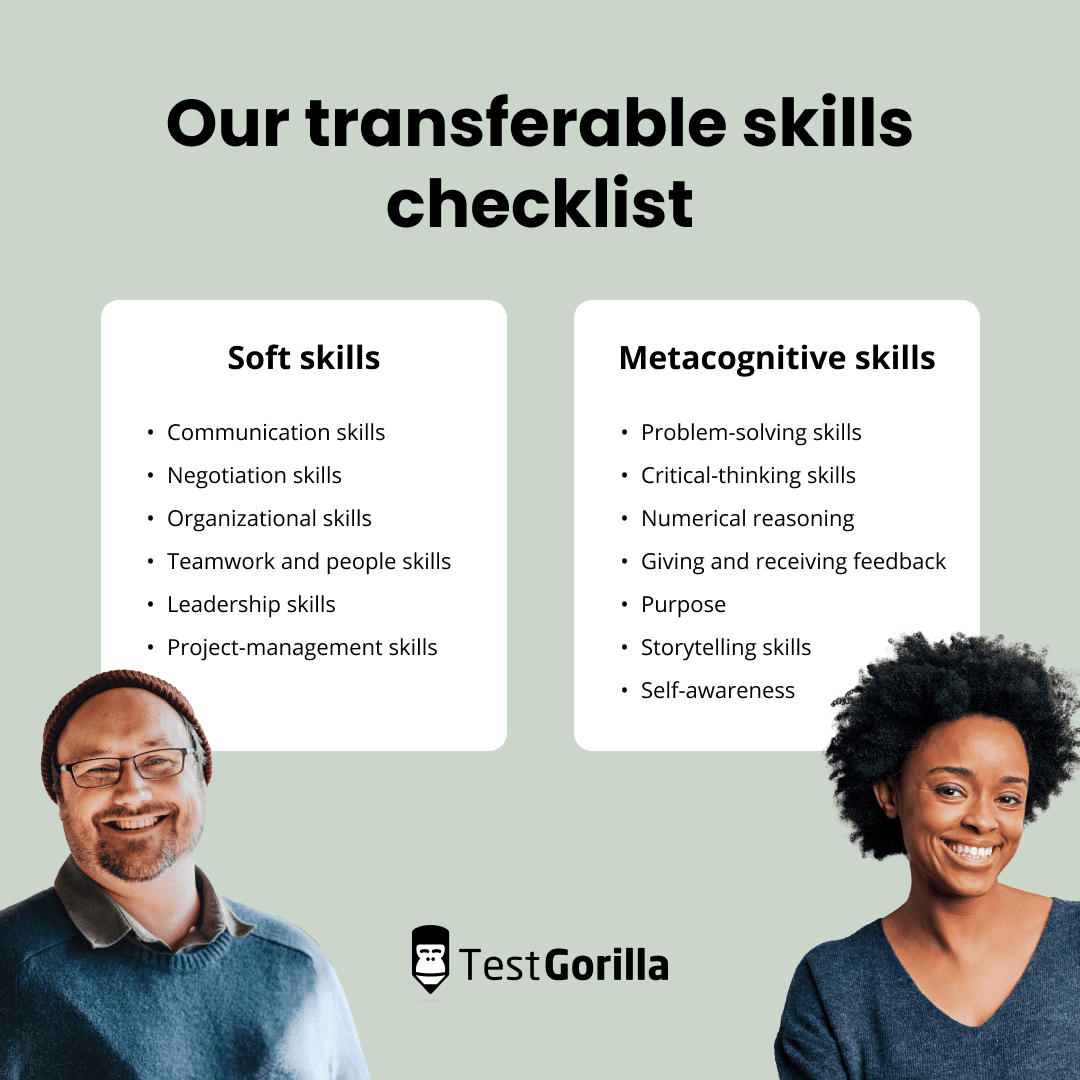Transferable skills checklist: A comprehensive guide for employers
Finding the perfect candidate is tricky when you have such a long list of “must-haves.”
You need to look at experience, hard skills, educational background, and years of employment history – and that’s before you’ve even considered character fit.
It can narrow the pool quite a bit.
Employers need a way to broaden the candidate pool and attract more talent while increasing the chance of finding the perfect fit for the position.
A transferable skills checklist can help you find an excellent candidate, no matter how “unmatched” their skill set might initially appear.
Individuals can learn to adapt to different roles with the right skills and attitude.
For example, a business development specialist may be a different job title than a project manager, but both require similar core skills of planning, determining timelines, and organizing a team.
Intrigued? Then let’s see how you can use a transferable skills checklist and figure out the right skills to include.
What are transferable skills, and why are they important?
A transferable skill is an ability or experience that can be applied to different roles. These skills can be transferred from one job, or even a project or event, to another role.
Transferable skills enable job seekers to find new opportunities outside their specialism – particularly in a post-pandemic world where the consensus is that transferable skills are a life raft.
Learning how to identify transferable skills is essential for both employer and employee because:
57% of workers can’t identify transferable skills with confidence
58% of workers aren’t sure how to include transferable skills on their resume
A further 34% can’t provide solid examples of how their skills would apply to another job.
This also means that resumes, CVs, and cover letters won’t necessarily relay a candidate’s true potential because the candidates themselves don’t know how to express their skills.
Learning how to identify transferable skills and match them to open roles is crucial when adopting skills-based hiring practices.
What is a transferable skills checklist?
A transferable skills checklist helps clarify a candidate’s talents and abilities. It shows an employer what a candidate can bring to a role and enables the candidate to identify the broad talents they possess.
They generally include:
Leadership skills
Social skills
Creative skills
Word and communication skills
Data skills
Time-management skills
A wide range of positions and industries require these skills, so it’s in a recruiter’s best interest to know how to spot them, know their worth, and prove them with skill assessments.
Are you a candidate? No problem. Although this article is mainly for HR professionals and recruiters, you should stick around and see which transferable skills are in high demand.
This will help you remain one step ahead of the other candidates.
The best insights on HR and recruitment, delivered to your inbox.
Biweekly updates. No spam. Unsubscribe any time.
How to use a transferable skills checklist
You can use a transferable skills checklist to identify the key skills you want and need in a recruit.
They’re an important part of a modern recruiter’s toolbox, and using a transferable skills checklist in your hiring process is an easy practice to adopt.
Here’s a quick step-by-step guide:
Assess the skills needed for a role, considering the key soft skills
Create a transferable skills checklist for your organization
Include transferable skills in your job ads, e.g., communication and organization skills
Include your transferable skills checklist in your job application
Insert key skills into your pre-employment skills testing checklist to guarantee aptitude
Interview successful candidates to further evaluate their fitness for the role
Wait a minute – step two is creating your own transferable skills checklist?
Don’t worry, we’ll help you with that one. Did you know you can also create a resume screening checklist to help you with shortlisting candidates?
Our transferable skills checklist
Let’s take a look at our transferable skills checklist, which you can start using in your hiring process today.
This checklist lets you zero in on candidates based on raw talent, regardless of their background.
For example, even if your candidate is a former school teacher, they may excel at event planning due to their leadership, communication, and organizational skills.
First, let’s look at a summary of the two main categories of transferable skills:
Soft skills | Metacognitive skills |
Communication skills; Negotiation skills; Organizational skills; Teamwork and people skills; Leadership skills; Project-management skills | Problem-solving skills; Critical-thinking skills; Numerical reasoning; Giving and receiving feedback; Purpose; Storytelling skills; Self-awareness |
Now let’s dig deeper.
Soft skills
Soft skills are essential in a transferable skills checklist.
It’s important to note that 89% of talent-acquisition professionals say that when a new hire doesn’t work out, they lack crucial soft skills.
A candidate can have technical skills and experience and still not be the right fit due to insufficient soft skills.
1. Communication skills
These skills involve public speaking, leading discussions, and active listening. They apply to nearly every role – and they’re essential for people working as part of a team.
Yes, “communication is key” is a tired old adage, but communication is a genuine skill and depends on when and how you do it.
Communication skills are critical for productivity, avoiding risk, problem solving, and customer-facing correspondence.
An example in which communication is necessary is in project management. Maybe a team member anticipates they won’t have time for one of their tasks.
Let’s look at the scenario communicated well vs. not communicated well.
Communicated well | Not communicated well |
A team member communicates this issue as early as possible to their PM The PM promises a realistic solution and follows through The PM makes the team member feel rewarded for sharing the problem The PM contacts other team members to help solve the issue | A team member communicates the issue at the last minute The PM shames the team member for struggling with their problem The team shifts into firefighting mode There’s a total relationship breakdown within the team, and with the client |
This is an example of solid vs. risky communication on all sides.
So you see, it really isn’t just a cliched adage.
Let’s take a look at a checklist of specific abilities and traits that confirm if someone has communication skills:
Listening
Writing
Public speaking
One-on-one communication
Active listening
Our Communication test is a reliable way to test a candidate’s communication skills in your hiring assessments.
2. Negotiation skills
Negotiation skills are used to enable two or more sides to reach a mutual agreement.
These skills help prevent conflict, solve problems, and sell your services or products.
Various scenarios across job roles require negotiation skills:
Discussing pay raises or pay rates
Figuring out internal capacity changes with team members
Making deals and determining payment terms with clients
Discussing a leave of absence or vacation
Settling legal matters
Settling supply agreements with vendors
The ability to successfully settle conflicts and reach agreements is critical in many positions. It not only solves current issues but also prevents future ones.
Now, let’s look at a checklist of the things someone with good negotiation skills should have:
Emotional intelligence
Persuasion
Communication
Active listening
Add our Negotiation test to your checklist to test your candidate for these skills.
3. Organizational skills
These skills help workers use their time, energy, and physical space efficiently and effectively.
Organized employees can prioritize tasks, stay focused on them, complete them successfully, and meet deadlines – leading to better productivity and a higher quality of work.
Plus, if a candidate has a well-structured and personalized organizational process that has been successful in previous roles, they can bring much-needed expertise to the team.
Suppose they already use a Pomodoro timer or have a particular approach for setting up their work calendar. In that case, they’re coming to the table already equipped with a methodical framework they’ve used successfully in other positions.
It’s a bonus if they’ve also helped other companies improve their organizational processes.
Here’s a checklist of some of the traits important for organizational skills:
Time management
Delegation and planning
Prioritizing tasks
Attention to detail
Demonstrating organizational skills in context is the best way to confirm aptitude, but a great way to get a starting idea is to include a Time Management test in your job assessment.
4. Teamwork and people skills
Teamwork is one of the most crucial skills, but it’s also tough to evaluate because you need this individual to adjust and thrive in your team’s unique culture.
Teamwork and people skills include:
Delegation
Willingness to help others
Playing to others’ strengths
How they lead
How they respond to being led
Conflict management (being able to mediate problems)
Bringing a team together after a breakdown
Performing under pressure is critical for teamwork and people skills. It’s just as important to determine how your candidates demonstrate people skills when things aren’t going well as it is when things are going well.
Here’s a checklist of specific abilities and traits essential for teamwork and people skills:
Collaboration
Conflict management
Communication
Active listening
The best way to evaluate team skills is to ask candidates to highlight their experience. Ask them open and searching questions. Tough interview questions are an excellent way to observe a candidate’s true potential.
Another great way to discover teamwork and people skills in your candidates is to reach out to their references.
5. Leadership skills
Leadership is all about engaging, motivating, and directing a workforce.
These skills affect:
How a candidate interacts with teams
How they approach business strategy
How they communicate with and manage stakeholders
Leadership is a nuanced skill directly linked to your company’s needs. This means that resumes cannot accurately demonstrate if a candidate has the leadership skills you require.
Just because it worked for their last position doesn’t mean it will suit your organization’s needs and culture.
Here at TestGorilla, we define 10 leadership styles in business, including coaching, visionary, pacesetter, and more. You can read about them in full in our article on leadership styles.
Let’s take a look at the checklist of some of the abilities necessary for leadership skills:
Coaching, mentoring, and feedback
Strategic thinking
The ability to motivate and convince others
Problem solving
You can evaluate a candidate on these skills by adding our Leadership and People Management test to your next pre-employment assessment.
6. Project-management skills
These are the capabilities and traits necessary to effectively coordinate and execute a project from start to finish.
The ability to organize, plan, and complete a project requires interpersonal and motivational skills and can be the difference between failure and success.
These skills are essential for a variety of roles, including engineers, marketers, developers, and teachers.
Nevertheless, it’s important to note how crucial this transferable skill is when hiring project managers in particular. It’s at the very foundation of the role.
You should be aware that only 47% of projects in 2021 were run by trained PM professionals – which means you shouldn’t focus on professional PM credentials, but rather on the skills necessary to be effective in this position.
These skills include organization, communication, balancing priorities, and risk management.
Now, let’s look at the checklist of specific qualities that confirm if someone has project-management skills:
Critical thinking
Risk management
Scheduling and time management
Communication
You can easily evaluate a candidate for this ability by adding our Project Management test to your transferable skills assessments.
Metacognitive skills
Metacognitive skills, or meta-skills, look similar to soft skills at first but play their own important, distinct role.
Essentially, meta-skills are the foundation for learning other skills. They’re an individual’s abilities from which they can develop other skills.
1. Problem-solving skills
Problem-solving is the process of defining a problem, identifying the cause, and finding possible solutions.
These skills are all about removing obstacles to reach an ultimate goal with little detriment to the original plan. Active listening, research, analysis, and good decision making all help a candidate’s base problem-solving skills.
Many job roles require or benefit from keen problem-solving skills. For example, a construction worker may discover a key safety issue in the field and report it to a higher authority.
This authority listens to the worker, confirms the issue, then finds the appropriate teammate to help address the problem.
Both the worker and the higher authority show problem-solving skills in this scenario.
Let’s look at the checklist of what an individual problem-solving skills is good at doing:
Spotting issues
Analyzing the root causes
Identifying the right stakeholders to fix the issue
Coming up with solutions
Working together with the right people to implement a solution
Resilience throughout the process
To see if a candidate possesses these skills, try adding our Problem-Solving test to your checklist.
2. Critical-thinking skills
Critical thinking is a form of emotional intelligence that enables an individual to analyze facts and come to a conclusion.
These skills enable a person to think clearly, make level-headed decisions, and assess a situation rationally, even in a crisis.
Critical thinking gives a candidate valuable insights into a situation at face value, without having to hear every detail. Make no mistake – they aren’t psychic, they’re just skilled at putting two and two together.
This means critical thinking also helps make logical connections between two or more concepts.
Here’s a critical-thinking skills checklist of specific qualities:
Identifying biases
Research ability
Identification
Curiosity
Judging relevance
Sound reasoning
Add our Critical Thinking test to your checklist to help you evaluate a candidate’s abilities effectively and without bias.
3. Numerical reasoning
This is the ability to interpret numeric data. A candidate skilled in numerical reasoning can analyze and utilize numeric data quickly and efficiently.
Numerical-reasoning skills include traditional arithmetic, such as adding, subtracting, multiplying, and dividing, but they can go much deeper than that.
Typically, numerical reasoning displays how a candidate handles data, interprets graphs and tables, and helps them with pattern recognition.
Many industries benefit from solid numerical-reasoning skills, such as accounting, banking, engineering, and IT.
Now, let’s look at a checklist of abilities that confirm if someone has numerical-reasoning skills:
Handling and interpreting numerical data
Analyzing numerical data
Dealing quickly and accurately with numbers
Dealing with ratios, percentages, and number sequences
Interpreting graphs, charts, and diagrams
You can add TestGorilla’s Numerical Reasoning test to your checklist to evaluate a candidate’s aptitude with numbers.
4. Giving and receiving feedback
Feedback skills are an essential part of workplace communication and teamwork.
Receiving feedback is key to building new skills, completing work effectively, and building strong work relationships. Giving constructive and effective feedback is an essential part of leadership.
It’s also important to remember that “feedback” isn’t necessarily a negative term, so a candidate must be skilled at providing supportive feedback when a colleague is doing something right.
Most roles involve providing feedback in some form or another, but it’s an essential skill for managers, editors, and coaches.
Here’s a checklist of the things someone with good feedback skills will do well:
Communication
Unbiased judgment
Active listening
Mentoring and coaching
Negotiation
The only way to genuinely evaluate a candidate’s ability to give and receive feedback appropriately is to implement a trial or roleplay test in the interview.
Afterward, give the candidate your honest feedback and assess their reaction.
5. Purpose
This refers to a candidate’s strength and belief in their purpose and goals. It gives them a sense of direction and intention.
A sense of purpose in your workplace can increase engagement, improve identification with the job, and benefit overall mental well-being.
When candidates feel connected and have a sense of purpose in what they do, they’re more productive and produce a higher quality of work.
Here’s a checklist of the traits to help you understand if someone has a sense of purpose in their work:
Goal oriented
Planning
Leading through change
Solidifying ideas
Big-picture thinking
Yes – this is a difficult trait to evaluate because it’s somewhat subjective.
It’s best to focus on a candidate’s experience and examples from previous roles to assess if a candidate has a sense of purpose in their work.
You have to dig in with broad, open interview questions and use predetermined criteria for the responses you’re looking for.
6. Storytelling skills
Storytelling skills help a candidate relay information, direct and capture an audience, and educate others.
A good storyteller should be able to make a conversation relevant, helpful, and memorable.
The ability to display information in a relatable, absorbable way is essential for many positions, such as salespeople, content writers, and copywriters.
Let’s look at the kinds of qualities someone with storytelling skills will have:
Creativity
Attention to detail
Being direct and concise
Timing
Humor
Fluency
Trials, tests, and roleplaying are best for assessing storytelling skills.
For example, a writer could be assigned a trial sample to write in a client’s brand voice, or a salesperson could be given a scenario and product to “sell” to the interviewer.
7. Self-awareness
This is the ability to monitor and regulate your own emotions and reactions.
Self-awareness enables a candidate to identify their strengths, weaknesses, and triggers. These skills can contribute to most job roles and build a stronger company culture.
Self-awareness is a subjective skill since one recruiter’s idea of self-awareness might differ significantly from another’s.
Here’s a checklist of specific traits to help you understand if someone has self-awareness:
Adaptability
Confidence
Mindfulness
Empathy
Patience
Use this checklist to give you a solid idea of what to look for in your candidates, then adapt it according to your understanding and preferences to evaluate them.
A transferable skills checklist opens the door for better hiring
The modern world is shifting away from traditional hiring methods, and many skilled candidates are branching out from their work experience to use their skills in new ways.
A transferable skills checklist enables recruiters to identify and recognize these skills, so they can make decisions untainted by biases based on history or qualification.
This checklist also helps you create better job descriptions and attract the right talent.
Then you can turn to online skills testing to prove these skills, confirm a candidate’s aptitude, and determine if they’re a good culture add.
To learn more about hiring a candidate for talent and ability, read our article on skills-based hiring and sign up for your free TestGorilla plan today.
When you've found your dream hire, you might find our article on creating an onboarding checklist helpful to ensure a smooth onboarding experience.
You've scrolled this far
Why not try TestGorilla for free, and see what happens when you put skills first.


















